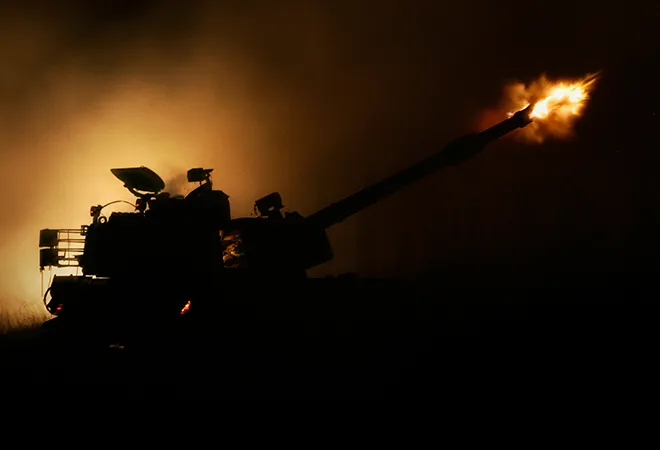-
CENTRES
Progammes & Centres
Location

Image Source: Yaniv Ben Simon/Getty Images
Picture of shelling at night on Israel-Lebanon Border
On 4 December, Israel began “Operation Northern Shield’ to expose what it called Hezbollah’s cross border terror tunnels. It triggered tensions and put the armed forces in Lebanon on high alert. As Israel began digging, fears of a conflagration heightened. There has been relative peace for 12 years on the Israel - Lebanon border, though the sense of security has been fragile.
Israel’s Prime Minister Benjamin Netanyahu said that the tunnels are a part of a wider effort to “inflict great danger” to Israel. Other Israelis in authority said that Hizbollah intended to use these tunnels to infiltrate men and arms to kidnap Israel’s citizens and execute terror activities in Israel. Some Israeli officials even claimed that the tunnels play a vital role in Hizbollah’s plan to conquer a part of the Galilee.
The Israeli defence forces released a video of a tunnel on their side of the concrete wall demarcating the two countries. This tunnel was big enough for three or four people to walk in. The Israelis said that some of the tunnels are 200 meters long, 2 meters in height and width and fitted with ventilation to provide air while crossing.
So far, Israel has found four such tunnels. The UN peacekeepers, the United Nations Interim Force in Lebanon (UNIFIL), confirmed their presence and said that two of these cross the blue line.
In a statement, UNIFIL said, “Based on UNIFIL’s independent assessment, UNIFIL has so far confirmed the existence of all the four tunnels close to the Blue Line in northern Israel. After further technical investigations conducted independently in accordance with its mandate, UNIFIL at this stage can confirm that two of the tunnels cross the Blue Line.”
While neither Israel nor the UNIFIL have given any evidence that Hizbollah ordered the construction of the tunnels, it is hard to conceive an entity other than them to be calling shots in South Lebanon bordering Israel.
But the operation has come under question. Israel has claimed to know about the tunnels for long so why act now? The first doubt is over the timing. Israel’s Prime Minister announced the operation just two days after the Israeli police recommended that he be indicted for fraud, bribery and other charges. He is currently embroiled in three corruption cases.
The opposition parties in Israel saw the latest confrontation with Lebanon as a ploy by Netanyahu to present himself as a strongman candidate in the upcoming elections in Israel.
Second, experts say, if Hizbollah is indeed building tunnels from Lebanon into Israel, it is hardly a surprise. These ardent observers of the region point to the previous statements of Hizbollah’s Chief Hassan Nasrallah, who has said that the next conflict will be fought not just in Lebanon but also on Israeli territory. That the Hizbollah will use all its tactics to attack on Israeli territory -- quite possibly even the tunnels -- is widely accepted.
The presence of tunnels within Lebanon has been an open secret in the country. Their construction is justified or better glorified by the people in South Lebanon who witnessed Operation Litani in 1978, the Israeli invasion of the area in 1982 and the 2006 war. The use of the tunnels in the 34-day war in 2006 has become a part of the area’s folklore.
But the Israeli opposition pointed out that instead of the tunnels, the Prime Minister should have focused on coming up with a strategy to deal with the organization’s lethal weapons such as rockets.
The operation was also seen as another move by Netanyahu to defame the UNIFIL, which Israel has always thought to be fruitless in handling the threat presented by Hizbollah. The group, much to the chagrin of Israel, has continued to expand in South Lebanon, despite the presence of the peacekeepers.
Israel has wanted to replace the UNIFIL with another international force, one more in sync with their aims. This too, an expert opined, is a self-defeating gambit for Israel since it would be extremely hard if not impossible to put together such a dream force favoring Israel. Nevertheless, the argument against Netanyahu over exposing the tunnels and calling it much ado for nothing is weak. He may have timed it to his political advantage but he does have a right to protect Israel’s sovereignty.
UNIFIL says it is limited by its mandate and cannot conduct searches in private properties in Lebanon. Israel claims the tunnels have been dug in residential homes or private buildings in areas like Kfar Kila facing Israel. For whatever reasons, if the UNIFIL is unable to check such violations, then Israel is expected to bring them to global attention.
But just as Israel expects its sovereignty to be respected, it must answer for the 1400 violations it has committed against Lebanon’s sovereignty. Even if flying planes in Lebanon’s skies to hit Hizbollah in Syria does not match the threat presented by the tunnels, it is the principle that counts. Then again, there wouldn’t be a problem on the borders in the first place if both Israel and Hizbollah paid heed to the fairness of their methods.
The bigger concern in the region is that the tunnel operation may be the first indicator of the war shifting from Syria to Lebanon. Thus far though, calm has prevailed. Hizbollah did not respond to what the Lebanese termed an Israeli provocation. The group has lost a lot of men in the Syrian war and isn’t looking for another armed conflict for now.
The views expressed above belong to the author(s). ORF research and analyses now available on Telegram! Click here to access our curated content — blogs, longforms and interviews.

Anchal Vohra was a Fellow at ORF. She writes on contemporary developments in West Asia and on foreign policy.
Read More +